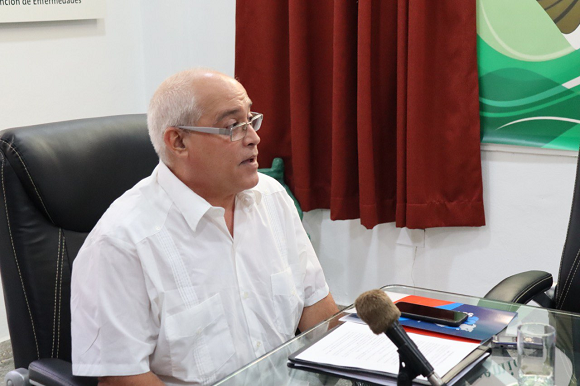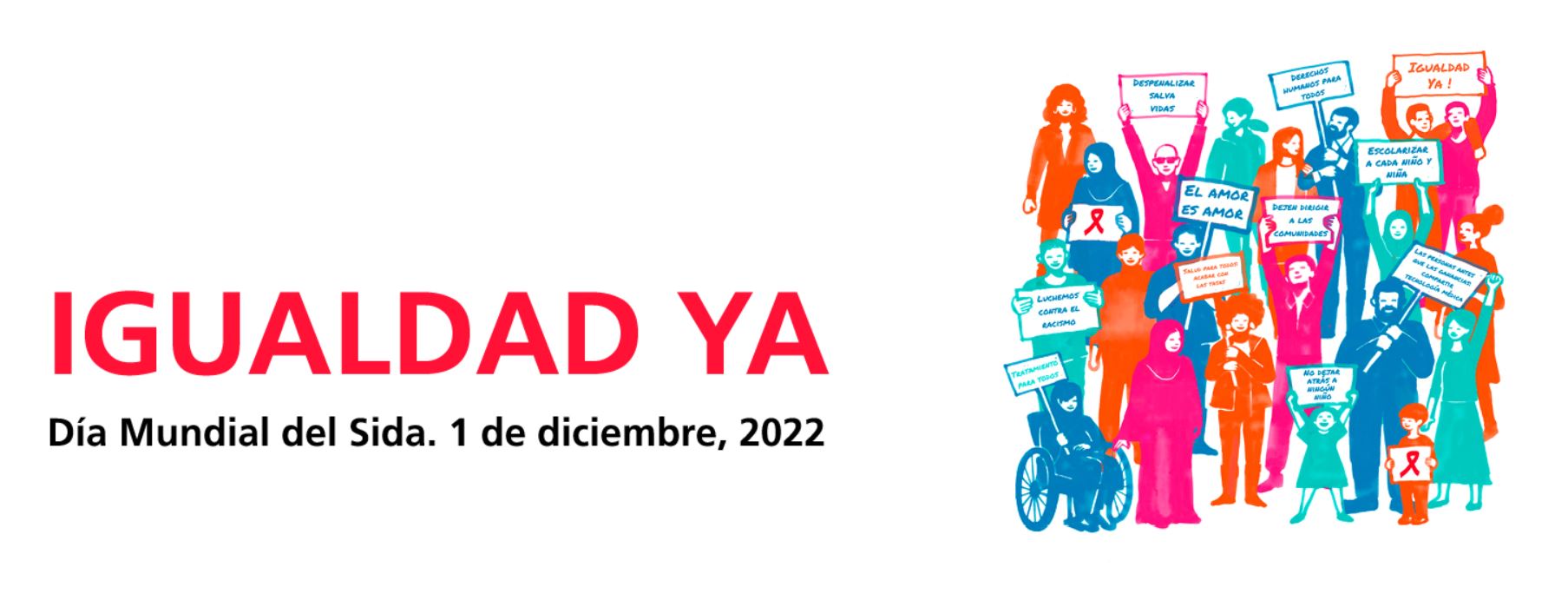Every year, on December 1st, the world celebrates World AIDS Day. This year the slogan of the campaign is: Equality Now, a slogan that incorporates a whole list of challenges that World AIDS Day has alerted the whole world about.
Cuba reaches this date with indicators that speak of sustained work in the search for a comprehensive response to HIV and awareness of the need to make visible and work with existing inequalities and gaps in this area, to continue advancing in this purpose.
Los Stigmas, stereotypes, prejudices and other forms of inequality have an impact on people's efficient access to services in general and to health services in particular, which can limit the extent of actions aimed at controlling the AIDS epidemic, which is why this year's activities for the date have the slogan "Equality, the best response to HIV".
With around 1,500 annual cases and a prevalence rate that remains at 0.4%, according to Dr. Manuel Romero Placeres, Head of the National HIV Prevention and Control Program, the epidemic in the Caribbean nation continues to have a higher incidence among men who have sex with men (MSM) and the transgender population, which account for 80.4% of the total.
These groups are usually the most affected by discriminatory attitudes, one more reason to assume the fight against inequalities as an important step in prevention.

Romero Placeres commented that the country exhibits favorable indicators regarding women and maintains the status gained in 2015 that certifies the elimination of mother-to-child transmission of this virus. Photo: Cubadebate.
At a press conference, Romero Placeres commented that the country exhibits favorable indicators in terms of women and maintains the condition gained in 2015 that certifies the elimination of mother-to-child transmission of this virus.
The health system, together with the United Nations Development Program (UNDP), the Pan American Health Organization (PAHO) and the United Nations Children's Fund (Unicef) have worked hard during the year to obtain these results, the executive added, particularly in the midst of the difficult economic situation in the Caribbean nation is experiencing.
However, he pointed out that despite the wide coverage of anti-retroviral drugs, more intense and coordinated work is needed with other central government agencies and civil society networks in order to further increase the percentages of adherence to treatment.
We still need a little more to ensure that transmission due to poor adherence is reduced every day," explained the Head of the National Program. We have worked very hard so that people living with HIV do not die of AIDS, and we are trying to achieve indicators of 90-90-90 by 2026, and 95-95-95 by 2030, where the first figure corresponds to those who know they are living with HIV, the second to those who have anti-retroviral treatment, and the third to those who achieve an undetectable viral load.
"Right now we have 86% of people who know they are living with HIV; 95.3% of those on treatment, and 88.6% with undetectable viral load, very important figures, and we are working to end 2022 above 90% in all three indicators."
Romero Placeres stressed the importance of prevention and education actions coming not only from the health sector, but also of community participation in the activities, which is the only way to advance in these indicators and achieve the 2030 goals.
In this regard, Yoire Ferrer Savigne, Deputy Director of the Health Promotion and Disease Prevention Unit, Prosalud, thanked the more than 18,000 volunteers throughout the country who participate in prevention actions in the communities through peer education.
He highlighted the political will of the Cuban State to maintain HIV as a health problem, which allows working with greater comprehensiveness. "Our plan is fundamentally based on access to prevention, diagnosis and testing; the comprehensive approach to gender gaps, stigma and discrimination; promotion of rights, and the participation of social sectors in all of this," he said.
Ferrer Savigne emphasized the relevance of focusing the efforts of these days on the most vulnerable groups, as well as the role of the media in spreading the message. He insisted on the importance of reaching with actions the places where young people live, schools and recreational centers, women's and family counseling centers, health institutions and at the community level in those places most affected.
The central activity will be in Villa Clara, one of the provinces that deserves recognition for the effort made even during the pandemic, said the specialist, who detailed that it will be accompanied by mobilizations, interventions and activities linked to ministries, where volunteers and specialists will develop awareness-raising tasks.
The culmination of the program, he added, will be the Cultural Gala on December 1 at 8:30 p.m. at the America Theater.
Confronting inequalities in the fight against HIV
When asked by Cubadebate about the persistence of stigmas against people living with HIV, the executives agreed that although there has been a reduction, there are still attitudes in the provision of health services that have a negative impact on the fight against the epidemic.
One example to which they referred was that when the transgender population goes to these spaces, they sometimes encounter a reticent attitude within the medical work, fearing how to treat, how to touch that person; because even when it is part of the medical practice, the health personnel may be permeated by doubts and concerns coming from their sociocultural aspect.
These ways of behaving generate discomfort in this community and demonstrate the importance of addressing the phenomenon of inequalities.
The objective, they pointed out, is to transform health services into friendly spaces, free of stigma and discrimination, and to work with key populations that are questioning hetero-normativity.
Every initiative, from the assistance point of view, must be accompanied by strategies and actions that, from the legal point of view, eliminate the inequalities and prejudices that can accentuate these gaps, they remarked at the press conference, and pointed out that in this sense the country is lucky, since it has the tools, the spaces, the institutions and the political will to see public health as a first space or the first face that receives and where the person is welcomed.
That is why this day should contribute to start from those scenarios the initiatives to ensure that people increasingly have access to health services, because it is not only about working with those who are positive, but above all, to prevent, particularly in risk groups.
A fundamental achievement, said jurist Zulendrys Kindelán Arias, is the Legal Orientation Service for key populations in the national response to HIV, which makes it possible to provide knowledge and accompany people in solving various problems related to these issues. They also play a significant role in training and sensibilizing service providers and decision-makers, one of the lines of action of this year's event.
Romero Placeres, said that with the collaboration of the United Nations agencies on the island, there is a network of projects that include differentiated health services.
"We have 30 municipalities prioritized, mainly by HIV prevalence, as well as the number of targeted key populations and other variables. Within those 30, we have managed to strengthen a polyclinic in each of those municipalities with such differentiated services for attending these key populations, with a whole strengthening of laboratories, to perform in addition to the complementary ones a set of tests such as viral load and specific analyses," he added.
He listed others, such as the preexposure service offered in eight provinces, where the negative person who is at substantial risk, that is, who may have sexual relations with a person living with HIV, can receive a follow-up, is given a specific tablet, is then provided with a test and a work strategy was established.
"We want to expand it," he stressed, and made allusion to the post-exposure service, also available in several places and which has as its center the person with a risk behavior for having had relations with a person living with HIV.
The Head of the National HIV Prevention and Control Program acknowledged the impact that the country's difficult economic situation has had on the acquisition of condoms, one of the fundamental elements of the Cuban campaigns, however, they are prioritized with the delivery of these to at-risk populations such as pregnant women, he commented.
"There is another strategy we are developing that includes the use of self-testing. The person can request them, in these differentiated services, to take the test personally at home and define whether they are positive or not."
"If we manage to have all the people treated and suppressed, HIV will be reduced as a health problem in the world and in Cuba, as life has shown. The combined prevention strategy that the country is defending today is heading in this direction and helps us to address gaps such as the lack of condoms," said Dr. Jackelin Sanchez Fuentes, an officer of the Department of STIs, HIV and Hepatitis, of the epidemiology area of the Ministry of Public Health.
The call, however, continues to be for self-care and prevention, she emphasized. "Community participation must be aimed at self-care, to have protected sexual relations, and that people at risk are also capable of always taking care of themselves in the event of sexual exposure in a given activity," Romero Placeres pointed out.
Translate from the original published in Cubadebate.
